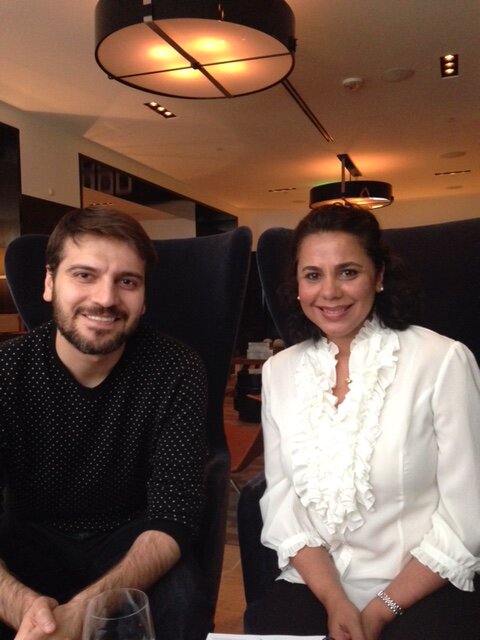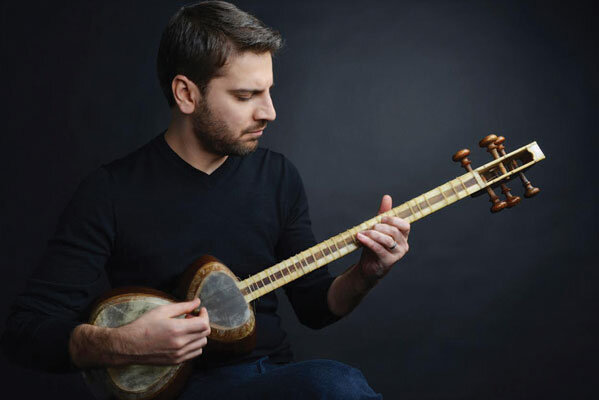Centered: The Music and Passion of Sami Yusuf
The questions during the live Twitter chat with the singer, songwriter and composer Sami Yusuf a few weeks ago were pouring in, hundreds every few minutes, from all corners of the world, asking about various aspects of his life, from his taste in food and movies (Burgers or pizza? Have you watched Harry Potter?), to when he would be coming to perform in their country (from Morocco to Bangladesh, Syria to Sweden), to more weighty issues (What is your life’s most memorable moment? Who is your role model? When you’re 90, what will matter most to you?). The conversation was peppered with profuse declarations of love and adoration (I adore you! Why are you so handsome? You’re the most tolerant, kindhearted and humble artist I’ve ever seen. I can’t sleep without listening to your songs.). From the frenzy of incessant questions and adulation—over 5,000 in about two hours—Yusuf could have been any mainstream pop star with a devoted international fan base, one who knows how to use social media to capitalize on his success.
But a conversation with Yusuf reveals a different, more nuanced picture—a star who doesn’t desire more fame, but would rather have more time for dhikr (remembrance of God); a devout Muslim who passionately believes that all of the world’s religions are expressions of the same truth; a musician who uses his songs to promote peace and tolerance, and his fame to help feed the world’s most needy.
Yusuf has sold over 31 million albums, packed concert halls around the world, and attracted a record-breaking 250,000 fans to Taksim Square in Turkey. He has more than six million Facebook fans, and his new single “Sari Galen” reached over one million views on You Tube in less than six weeks. He’s also amassed some impressive titles—Time magazine has called him “Islam’s biggest rock star”; The Guardian says he’s the “most famous British Muslim in the world”; and last week the European channel ARTE Metropolis declared him the “most successful British musician since the Rolling Stones.”
“I know many people dream of this kind of success, but all of my life, even when I was a teenager, I have tried to run away from it,” Yusuf said in an interview. “I wanted to live a life that was close to God; a life that was spiritual, in remembrance of Him.” Yusuf worried about the “petty, ego-centric, worldly” aspects of the music business. “But providence led me here; perhaps it was my calling,” he said. “I’m not complaining,” he quickly added, “I’m very grateful, Alhamdulillah.”
Providence—plus musical genes and a childhood steeped in music. Yusuf’s father is a musician, poet, songwriter, vocalist and multi-instrumentalist. But he didn’t want any of his children to go into the music business. “My father is a very conservative man, and he knows the environment; one has to be careful,” Yusuf said, adding, perhaps with a hint of exaggeration, “Of my 64 cousins, 50 are singers; the others are artists.”When he was six, Yusuf asked his father why he taught other students and not him. So one day his father gave him a book on the basics of the Persian instrument tombak, and asked him to continue studying while he went for a tea break. When he came back a half hour later, Yusuf said he had finished the book. His father, not convinced, asked him to play; Yusuf did. That was the beginning.He learned to play several other instruments, including the daf, tar, santoor, oud, violin and piano. When Yusuf was nine years old, a well-known Azerbaijani group came to London to perform, and he went to the concert with his father. When they learned who Yusuf’s father was, they presented Yusuf with his own tar. He learned to play on that tar and still has it. In his early teens, Yusuf was involved in music production with his father. Yusuf studied with traditional teachers and later at the Royal Academy of Music in London, and initially thought he would become a composer. His singing talents were discovered in his late teens.At the age of 16, Yusuf had a profound “religious awakening.” He wanted to leave music, and pursue law at King’s College London. But his friends recognized that he had a gift and encouraged him to make one album, of devotional songs for God and the Prophet Muhammad (pbuh). Yusuf went on a spiritual retreat, and recorded “Al-Muallim” (“The Teacher”) in 2003, when he was 23 years old. The album sold over seven million copies, and turned him into an instant star.And here we are 11 years later,” he said with a smile. “It was naseeb (destiny), maktoob (written).”Yusuf continued in music because he felt there was a need for the type of music he was producing, especially after the Sept. 11 attacks. Muslims, particularly young Muslims, were searching for a way to feel proud of their identity, and his songs seemed to have struck a chord. They are a blend of East and West, reflecting his own heritage and background—Yusuf was born to an Azeri family in Tehran and grew up in London, surrounded by people of different faiths and backgrounds. He sings in different languages and uses a variety of Persian and Western instruments. His well-produced videos are set in various parts of the world. The themes in his songs reveal Islamic values of respect, tolerance, compassion, and generosity, which are also universal virtues, thus helping to make the faith more relatable and accessible to all audiences.
“Music is an extension of who I am,” Yusuf said. “I’m a lover of the sacred, and music is an expression of my love for God and of the great traditions.”
Yusuf is uncomfortable with the labels that were being applied to his music, like “Islamic pop,” and he didn’t feel his songs fit existing categories, like nasheed. So he calls his genre “Spiritique.” His explanation of what this means provides some insight into Yusuf’s passion for intellectual pursuits.“Spiritique is a celebration of ‘sophia perennesis,’ or timeless wisdom,” he said, “You can find this wisdom or truth in all the great traditions; it is in Bulleh Shah and Maulana Rumi as well as in the teachings of Aristotle and other Greek philosophers. All that wisdom has a thread of truth in it, it has the sacred in it, and that’s what I’m concerned with. It’s celebrating that truth, bringing people closer to that timeless wisdom.” More simply put, he said, his music is a way to bring people closer together.“I can’t make music just for the sake of making music; there has to be a higher purpose,” he said. “When we come closer together, we know each other more; when we know ourselves better, we are closer to the sacred.” He added in Arabic, “The one who knows himself, knows God.”I had heard of Sami Yusuf and knew some of his songs—my husband had brought back his CDs from a trip to Cairo a few years ago—but I had little idea of his superstar status. My family and friends decided to go to his concert at the Strathmore Music Center near Washington, D.C., this September. The concert was a benefit for the Foundation for Traditional Studies, an organization that seeks to preserve and strengthen the world’s great traditions. Its president is Seyyed Hossein Nasr, the renowned scholar of Islam and someone for whom Yusuf has deep respect (he is currently reading “Knowledge and the Sacred” by Nasr); he too was at the concert. Yusuf’s upcoming album, “Songs of the Way,” his sixth, due out in January, is a tribute to Nasr, who composed several poems and recites them on the album.Yusuf has a charming presence on stage, humble and engaging. Often dressed in a black shirt or jacket, with a close-cropped beard, good looks, and a warm smile, it’s easy to see why he has so many adoring, especially female, fans. Yusuf sang a number of songs from his latest album, “The Centre,” as well as traditional favorites like “Hasbi Rabbi.” Many of his songs start off in English, and blend into one of the several languages in which he sings, including Arabic, Persian, Azeri, Turkish, Urdu and Malay. He has an easy rapport with his audience and encourages them to sing along. In D.C., we were perhaps more tepid than the crowds he’s used to in Istanbul and Cairo, but his music definitely had a visible and audible impact. My father-in-law, typically quiet and reserved, was clapping and tapping along; this was the first time he had heard Yusuf’s music and he said he felt uplifted. My husband said he felt more inspired to pray after listening to Yusuf’s music than he does after many Friday khutbahs (sermons).This is likely the type of reaction Yusuf is hoping for, although he is not one to admit it. “I don’t expect any particular emotion from my music, it would be too presumptuous, self-righteous,” he said when I told him of my family’s reaction, as we sat down to talk in the lobby of a downtown D.C. hotel. His wife joined us. Yusuf has been married for 10 years, but is guarded about his personal life. Instead, we talked about what inspires his music, his traditionalist worldview, his work with the United Nations World Food Programme, and why he thinks there is so much chaos in the world today.“We live in an era of unbelievable superficiality and ignorance, of consumerism, capitalism, forgetfulness, and modernity. You have extremists on all sides fist-bumping and shouting; there’s a lot of sentimentality, exclusivism, and emotion as opposed to real intellectual dialogue,” he said. “The message that I have, which may be controversial for some, is that all the religions of this world are ultimately expressions of the same truth. We have to be brave enough to believe in our own faith, but also respect and accept other orthodox traditions. And we have to promote cross-cultural, cross-religious and intellectual dialogue.”“The Centre” speaks to these issues. The title refers to the divine center, the truth at the heart of all traditions. He explained: “Lines radiate from the center to connect us to that truth. But as time goes by, people become more and more forgetful and get further and further away from the divine center. It’s only natural. That’s why prophets, and holy people and saints, are sent to remind us. Adam didn’t need a prophet; he was immersed in the center. But we’re not living in the time of the prophet (pbuh) or in 12th century Khorasan, when everything reminded you of God. We’re living in a time where everywhere you go, a pole is pulling you, not to the sky. These songs talk about our yearning for the center, for truth.”Yusuf feels people are longing for connection, substance, and tradition. That’s why classical concerts and traditional arts are so popular now he thinks, and why his album is topping the charts in so many countries. “In an era of forgetfulness and consumerism, it’s like divine compensation, a gift from heaven.”
I asked Yusuf how he stays centered, given his popularity, fame and the temptations of the business. “Meditation, contemplation, reflection and constant remembrance of God. There really is no other way,” he replied.
No doubt his humanitarian efforts help as well. Yusuf has worked closely with the World Food Programme since 2011, and in September he was appointed Global Ambassador Against Hunger. “Hunger is at the heart of so many of the world’s problems,” he said, “it kills your soul and spirit and aspirations.” According to the World Food Programme, over 800 million people don’t have enough to eat, and poor nutrition causes nearly half of all deaths among children under five.Yusuf recounted a story from his trip to Darfur, Sudan with WFP. He met a woman who was partially blind and whose husband had been paralyzed for eight years. Their daughter was helping support the family. That morning their son had attempted suicide. “I asked her how she was, and she said, ‘We are grateful. There are people who are worse off than us.’ ” Yusuf and his team were in tears. “How could there be anything worse than this I thought to myself.”In 2011, Yusuf composed a song called “Forgotten Promises” to raise awareness and funds to alleviate hunger in the Horn of Africa. All proceeds from the song were donated to WFP; each download helped feed two people. The music video, shot in 16 cities in eight countries, has almost nine million views on Facebook.This partnership with WFP led to the development of “LiveFeed,” a campaign to use the power of music to help feed the most vulnerable. In 2013, Yusuf recorded “Silent Words” to support efforts to help Syrian refugees, and in 2014 he recorded “Hope Survives” to aid those affected by Typhoon Haiyan in the Philippines. Profits from the song “Hear Your Call” were donated to Save the Children’s efforts in flood-affected areas in Pakistan in 2010. “Charity is a duty,” Yusuf said, “it is not something we should get an award for.”In December, WFP announced that because of a funding crisis it will need to cut food rations to over 1.7 million Syrian refugees, unless money is raised immediately. It launched an emergency social media campaign called the “72-hour movement” to encourage donations. Yusuf recorded a video message urging people to donate: “For you it’s a dollar, for them it’s a lifeline,” he posted on social media.“The truth is that we live in a very difficult time,” Yusuf said. “We live in a time when people don’t know who they are, where they come from, where they are going. In the 15th and 16th centuries, it was clear —we were living the sacred, breathing the sacred, everywhere we looked we would be reminded of the sacred. But now Western civilization is divorced from heaven.” I asked him how we can maintain tradition and a strong sense of identity, especially as our children grow up in a culture that makes it difficult to value these ideas; what advice does he have for young people, from his own experiences. He asked my son’s name. Zayd, I told him, Syed Zayd. “MashAllah, MashAllah,” he said, visibly excited by the title “Syed,” which indicates that Zayd is a descendant of the Prophet Muhammad (pbuh). “I mean, that’s unbelievable. What an honor.” Yusuf said there was power and responsibility inherent in his name, that Zayd should never think that the past was regressive, that he must understand where he comes from. “We have to remain honest and true to ourselves. We have to be kind to one another, and merciful to each other. We have to remember who we are, who we are ultimately. That’s the only way.”

